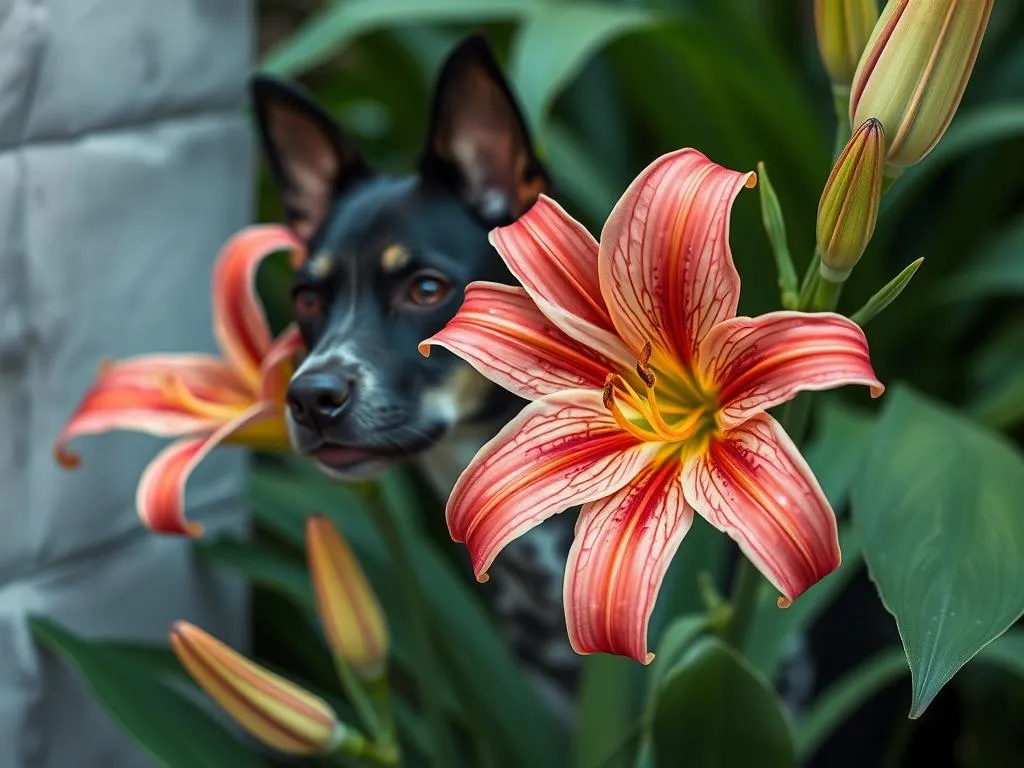
Introduction
Maintaining your dog’s health is crucial, not only for their well-being but also for the happiness of your entire household. Dogs can encounter various health concerns, from minor ailments to serious conditions, many of which can stem from their environment. As a responsible pet owner, being aware of potential hazards, including toxic plants, is essential. One specific question that often arises among dog owners is: Are canna lilies poisonous to dogs?
Understanding Dog Poisoning
What is Poisoning in Dogs?
Poisoning in dogs occurs when they ingest substances that are harmful to their health. This can include a variety of items, from human food that is toxic to specific plants. The symptoms of poisoning can vary widely depending on the substance consumed, but common indicators include vomiting, diarrhea, lethargy, and seizures.
How Dogs Get Poisoned
Dogs are naturally curious creatures, often exploring their surroundings with their mouths. This behavior can lead to accidental ingestion of toxic plants, foods, or chemicals. Common household items, like medications, cleaning supplies, and certain foods (like chocolate or grapes), can pose significant health risks.
Overview of Common Toxic Plants
List of Common Toxic Plants for Dogs
- Oleander: All parts are toxic; can cause severe heart issues.
- Sago Palm: Particularly the seeds; can lead to liver failure.
- Azalea: Ingestion can cause vomiting, diarrhea, and lethargy.
- Rhododendron: Similar effects to azaleas; can be fatal in severe cases.
- Foxglove: Contains toxins that affect the heart and can be lethal.
Why Some Plants are Toxic
Plants may produce toxins as a defense mechanism against herbivores. These toxins can affect dogs in various ways, often targeting their digestive or nervous systems. Understanding the specific toxins present in plants can help owners recognize the symptoms if their dog has ingested something harmful.
Canna Lilies: An In-Depth Look
What are Canna Lilies?
Canna lilies are vibrant, tropical plants known for their striking flowers and lush foliage. They are often used in landscaping due to their ability to thrive in various conditions and provide a splash of color to gardens and yards.
Are Canna Lilies Poisonous to Dogs?
Current research indicates that canna lilies are not considered poisonous to dogs. Unlike many other plants that pose serious health risks, canna lilies do not contain harmful toxins that would affect your canine companion. However, ingestion of any plant material can lead to gastrointestinal upset, so while they are not toxic, it’s best to monitor your dog if they show interest in these plants.
Comparison with Other Plants
When comparing canna lilies to other common toxic plants, it’s clear that canna lilies are relatively safe. For instance, while oleander and sago palms can cause severe health issues and even death, canna lilies do not carry the same level of risk. This makes them a more suitable choice for gardens frequented by dogs.
Recognizing Symptoms of Poisoning
Common Symptoms of Plant Poisoning
If your dog ingests a toxic plant, recognizing the symptoms early can be vital for their health. Common symptoms of plant poisoning include:
- Gastrointestinal Symptoms: Vomiting, diarrhea, and abdominal pain are frequent signs.
- Neurological Symptoms: Lethargy, seizures, and incoordination may indicate more severe poisoning.
- Behavioral Changes: If a dog becomes unusually agitated or unresponsive, this could signal a problem.
Prompt recognition of these symptoms can help ensure that your dog receives timely treatment.
What to Do If You Suspect Poisoning
Immediate Steps to Take
If you suspect your dog has ingested a toxic substance, the first step is to remove them from the environment. Ensure they are safe and calm, then contact your veterinarian or an animal poison control center immediately. Provide as much information as possible, including what your dog ingested and how long ago it occurred.
What to Expect at the Vet
When you arrive at the vet, they will likely perform a thorough examination. Possible treatments may include:
- Inducing Vomiting: If ingestion was recent, the vet may induce vomiting to prevent further absorption of the toxin.
- Activated Charcoal: This can help absorb toxins in the gastrointestinal tract.
- Supportive Care: Intravenous fluids and medications may be administered to stabilize your dog.
Providing clear information about the plant or substance ingested is crucial for effective treatment.
Preventative Measures for Dog Owners
Creating a Safe Environment
One of the best ways to safeguard your dog’s health is by creating a safe living environment. Here are some tips for dog-proofing your home and garden:
- Identify Toxic Plants: Familiarize yourself with plants that are harmful to dogs and remove them from your property.
- Secure Chemicals: Store cleaning supplies, medications, and other chemicals out of your dog’s reach.
- Supervise Outdoor Time: Keep a close eye on your dog when they are outside, especially in areas with unfamiliar plants.
Educating Yourself on Pet-Safe Plants
It’s essential for dog owners to educate themselves about pet-safe plants. Many non-toxic options can beautify your home without posing a risk to your furry friend. Consider adding the following plants to your collection:
- Bamboo Palm: Non-toxic and helps purify indoor air.
- Spider Plant: Safe for pets and easy to care for.
- Boston Fern: Adds greenery without risk to your dog.
Regular Health Care for Dogs
Importance of Regular Vet Visits
Regular veterinary check-ups are crucial for maintaining your dog’s health. Routine visits allow for early detection of potential health issues and ensure that vaccinations are up to date. Preventative care can save your dog from serious health problems down the line.
Nutrition and Diet Considerations
A balanced diet is a fundamental aspect of dog health. Ensure your dog receives a diet appropriate for their age, size, and activity level. Be aware of foods that are harmful to dogs, such as chocolate, onions, and grapes. Always consult your veterinarian regarding dietary changes or concerns.
Frequently Asked Questions (FAQs)
Are there any other plants that are commonly toxic to dogs?
Yes, several plants are known to be toxic to dogs, including oleander, sago palms, azaleas, and rhododendrons. It’s crucial to familiarize yourself with these plants and keep them out of reach.
What should I do if my dog eats a toxic plant?
If your dog has ingested a toxic plant, remove them from the area and contact your veterinarian or an animal poison control center immediately. Quick action can make a significant difference in the outcome.
How can I learn more about keeping my dog safe from poisoning?
Educating yourself about dog health and safety is essential. Resources such as veterinary websites, animal poison control centers, and books on pet care can provide valuable information.
Conclusion
Understanding the dangers of plants in your environment, including whether canna lilies are poisonous to dogs, is vital for responsible pet ownership. While canna lilies are not toxic, being informed about other toxic plants and recognizing symptoms of poisoning can help keep your dog safe and healthy. Stay proactive in your dog health care, and always consult with your veterinarian if you have concerns about your pet’s well-being.









